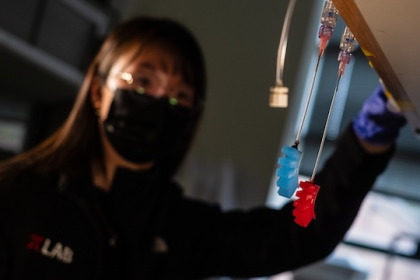Admin
This 3D printer can figure out how to print with an unknown material
While 3D printing has exploded in popularity, many of the plastic materials these printers use to create objects cannot be…
Revolutionary chronic wound treatment could help millions
An effective treatment for chronic wounds that does not involve antibiotics, but an ionised gas to activate a wound dressing,…
Millions are at risk using high arsenic water for cooking
The use of water contaminated with higher than recommended levels of arsenic could pose a serious health risk to millions,…
Rice research could advance soft robotics manufacturing, design
Quantitative framework enables tunable elastomer curing via temperature control Te Faye Yap, a Rice University Ph.D. student in the Preston…
Rice breakthrough could make automated dosing systems universal
Synthetic biologists’ hack blood-glucose reaction to create chemotherapy detector Rice University synthetic biologists have found a way to piggyback on…
BRAIN PROTEIN’S VIRUS-LIKE STRUCTURE MAY HELP EXPLAIN CANCER-INDUCED MEMORY LOSS
In a rare but serious complication of cancer, the body’s own immune system can start attacking the brain, causing rapid-onset…
Electrification or hydrogen? Both have distinct roles in the European energy transition
A key step to achieving climate neutrality in the European Union is to rapidly shift from fossil fuels to electric…
Paper Calls for Patient-First Regulation of AI in Healthcare
Ever wonder if the latest and greatest artificial intelligence (AI) tool you read about in the morning paper is going…

